NSG 6020 (NSG6020)
Kaplan University
Page 2 out of 17 results
Sort by

-
NSG 6020 / NSG6020 WEEK 4 QUIZ 3
- Exam (elaborations) • 8 pages • 2022
-
Available in package deal
-
- $8.99
- + learn more
NSG 6020 / NSG6020 WEEK 4 QUIZ 3. CARDIAC STUDY GUIDE QUESTIONS AND ANSWERS All of the following are possible causes for secondary hypertension? A. Acute pyelonephritis Which of the following antihypertensive medications has beneficial effects for an elderly White woman with osteoporosis? D. Thiazide diuretics A 75-year-old woman has been on nifedepine (Procardia XL) 10-mg capsule for many years to control her stage II hypertension. Her blood pressure at this visit is 165/80 mmHg. She i...
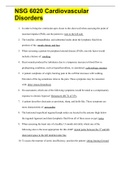
-
NSG 6020 Cardiovascular Disorders
- Exam (elaborations) • 12 pages • 2021
-
- $12.00
- + learn more
1. In order to bring the ventricular apex closer to the chest wall when assessing the point of maximal impulse (PMI), ask the patient to: turn to the left side 2. The tonsillar, submandibular, and submental nodes drain the lymphatic fluid from portions of the: mouth, throat, and face 3. When screening a patient for peripheral arterial disease (PAD), one risk factor would include a history of: smoking 4. Heart sounds produced by turbulence due to a temporary increase in blood flow in predispo...
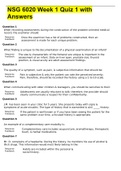
-
NSG 6020 Week 1 Quiz 1 with Answers| LATEST SOLUTION
- Exam (elaborations) • 3 pages • 2021
-
- $6.00
- + learn more
NSG 6020 Week 1 Quiz 1 with Answers • Question 1 When recording assessments during the construction of the problem-oriented medical record, the examiner should: Response Feedback: Once the examiner has a list of problems constructed, then an assessment is made for each unique problem. • Question 2 What finding is unique to the documentation of a physical examination of an infant? Response Feedback: The size & characteristic of the fontanel are unique & im...
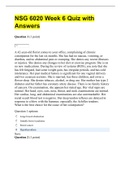
-
NSG 6020 Week 6 Quiz with Answers
- Exam (elaborations) • 10 pages • 2021
-
- $10.00
- + learn more
NSG 6020 Week 6 Quiz with Answers Question 1 (1 point) A 42-year-old florist comes to your office, complaining of chronic constipation for the last six months. She has had no nausea, vomiting, or diarrhea, and no abdominal pain or cramping. She denies any recent illnesses or injuries. She denies any changes to her diet or exercise program. She is on no new medications. During the review of systems (ROS), you note that she has felt fatigued, had some weight gain, has irregular periods, ...
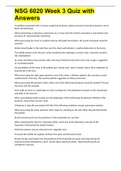
-
NSG 6020 Week 3 Quiz with Answers
- Exam (elaborations) • 4 pages • 2021
-
- $7.00
- + learn more
A condition associated with a chronic cough that produces copious amounts of purulent sputum is most likely: bronchiectasis When performing a respiratory assessment on a 4-year-old child, further evaluation is warranted in the presence of: supraclavicular retractions When percussing the chest in a patient who has left sided heart failure, the sound emanated would be: resonant Stridor heard louder in the neck than over the chest wall indicates: a partial obstruction in the larynx The middle s...
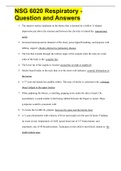
-
NSG 6020 Respiratory - Question and Answers| VERIFIED SOLUTION
- Exam (elaborations) • 6 pages • 2021
-
- $10.00
- + learn more
1. The anterior surface landmark on the thorax that is denoted by a hollow U-shaped depression just above the sternum and between the clavicles is termed the: suprasternal notch 2. Increased anteroposterior diameter of the chest, purse-lipped breathing, and dyspnea with talking, suggest: chronic obstructive pulmonary disease 3. The line that extends through the inferior angle of the scapula when the arms are at the sides of the body is the: scapular line 4. The lower tip of the scapula is loc...
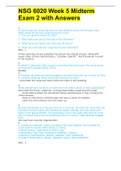
-
NSG 6020 Week 5 Midterm Exam 2 with Answers
- Exam (elaborations) • 6 pages • 2021
-
- $10.00
- + learn more
A patient tells the nurse that she has had abdominal pain for the past week. What would be the best response by the nurse? 1. “Can you point to where it hurts?” 2. “We’ll talk more about that later in the interview.” 3. “What have you had to eat in the last 24 hours?” 4. “Have you ever had any surgeries on your abdomen?” ANS: 1 A final summary of any symptom the person has should include, along with seven other critical characteristics, “Location: specific.” Ask the ...

How did he do that? By selling his study resources on Stuvia. Try it yourself! Discover all about earning on Stuvia


